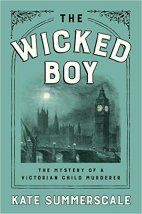The Wicked Boy: The Mystery of a Victorian Child Murderer - Kate Summerscale

The Wicked Boy: The Mystery of a Victorian Child Murderer - Kate Summerscale

Non-Fiction
Pages: 400
In East London in the summer of 1895 13-year-old Robert Coombes murdered his mother. His guilt was never in question, and he never denied the charges when the death was eventually discovered. For ten days after the murder, his mother's body lay rotting in the summer heat in an upstairs bedroom, whilst Robert, his younger brother Nattie and a simple-minded colleague of his father's whom Robert conned into taking care of the boys in their mother's 'absence', went to watch cricket at Lord's, to the seaside, coffee shops and the park, played cards and other games. Family members soon grew suspicious, and the crime was eventually uncovered. To say more of the events that took place would spoil readers' enjoyment, no doubt, so I will refrain, and simply say that only the first half of this book concerns the murder and Robert's trial.
Child murderers are always of interest - the dichotomy between such an abhorrent act and the perceived 'innocence' of childhood, no doubt - and a young boy who kills his mother and then acts with such cool unconcern in the aftermath all the more so. Yet I found this book disappointing, for all that. I've read and thoroughly enjoyed both of Kate Summerscale's previous books, The Suspicions of Mr Whicher and Mrs Robinson's Disgrace, but this one seems to lack depth in comparison. It felt very cursory, degenerating on many pages to little more than a 'he said/they said/he said' recitation of the trial records. At no point did I ever feel enthralled in the tale and none of the personalities involved ever felt more than potted characters on the page.
Perhaps that was because there was no 'whodunnit' aspect to the case; perhaps because the trial lawyers never sought to determine Robert's motive; perhaps because there is no extant record of Robert's thoughts, impulses or feelings after the trial or throughout his subsequent life - whatever the reason, Robert himself remained very much a cipher in these pages, impossible to understand or empathise with. As I said, at no point reading this book did I ever feel that there was any depth to the words on the page - it read as very much a 'this happened and then that happened and then he said this and she said that', and quite frankly I got bored. It took me less than a day to read this book, not because I was unable to put it down, but because it was such a light, cursory read it took no time at all to rattle through. I can only hope Kate Summerscale's next book reflects The Suspicions of Mr Whicher or Mrs Robinson's Disgrace, and not this one.